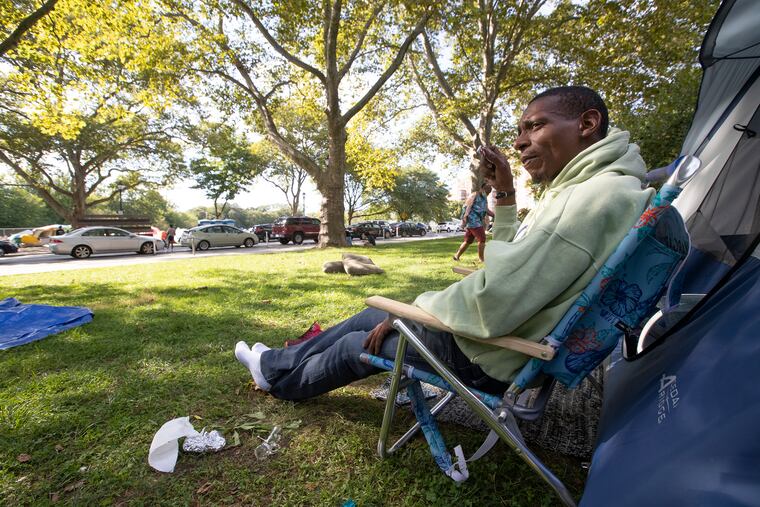Judge to rule Tuesday on whether city can clear out Parkway homeless encampment
Lawyers delivered closing arguments on Monday in a telephone hearing about the fate of the encampment and two others.

A federal judge said he would issue his opinion Tuesday afternoon on whether the City of Philadelphia can clear out an encampment of an estimated 150 homeless people who have been living along the Benjamin Franklin Parkway for more than two months.
At the same time, U.S. District Judge Eduardo C. Robreno will rule on the fates of two smaller encampments of homeless individuals: one outside the Philadelphia Housing Authority’s North Philadelphia headquarters on Ridge Avenue, and the other at the Azalea Garden near the Philadelphia Museum of Art.
On Monday afternoon, lawyers representing encampment occupants — who had petitioned the court seeking an injunction against eviction by the city — joined attorneys for the city and PHA in closing arguments in a telephone hearing.
Last week, occupants, neighborhood residents, and city officials testified on the matter. Monday’s session underscored what was argued during the initial hearing:
Plaintiffs said that encampment occupants have a First Amendment right to protest and assemble at the sites. Lawyers representing the city said that the encampments violate city laws prohibiting camping, and that the tent village on the Parkway, in particular, compromises public “health, safety, and welfare.”
The Parkway encampment was begun on June 10 as both a protest against the city’s shelter system and a demand for housing. Its organizers, who initially insisted that the Philadelphia Police Department give up its guns, linked their grievances to the Black Lives Matter movement.
The encampment of tents staked to a city-owned ball field at 22nd Street has been championed by some residents from the region who have supported it with food, water, and frequent demonstrations of solidarity.
Advocates for the homeless have tried numerous times to offer outreach services to encampment occupants throughout the last two months, but say they have been rebuffed by organizers and occupants, at times violently.
While some advocates describe the Parkway encampment as an organically occurring protest of Philadelphia’s crowded shelter system, lately made more dangerous by COVID-19, others believe that organizers are manipulating the homeless into carrying out a political agenda.
Meanwhile, neighborhood residents have grown weary of what they say has been an endless cycle of aggressive panhandling, intimidation, and unhealthy conditions perpetuated on a site meant for children’s softball, baseball, and tee-ball games.
Representing the plaintiffs, lawyer Michael Huff said on Monday that shuttering the encampment would violate occupants’ “First Amendment rights to protest the housing situation.” He added that inhabitants of the Parkway encampment “have a right to be out there and exercise their freedom of speech and assembly.”
Huff also said that the city provides no written rules for the notice it gives announcing the shuttering of an encampment, causing confusion and consternation. Further, he criticized the city’s method for cataloging how it stores the belongings of occupants of an encampment that is cleared out.
He concluded that he wants the city to provide a “clean and safe and clear path to permanent housing.” Huff also requested the city develop written protocols for property storage.
Representing the city, Chief Deputy City Solicitor Kristin Bray said there is “no question that poverty and ... consequences such as homelessness are deep societal problems.”
But, she said, the city is asking individuals to “stop using the Parkway” as a place to live, adding that the group at the site is “compromising public health, safety, and welfare."
Bray went on to say that demanding that people end camping on city land does not preclude their right to protest city policies toward the homeless in other ways.
At one point, Huff said the city wasn’t providing enough beds for encampment occupants to move to. Bray countered that the city “will find shelter for anybody who wants to have shelter.”
Advocates for the homeless, who have identified many of the occupants as people suffering from mental illness who had been living on the streets of Center City, say these individuals have long been resistant to living in shelters.
Organizers of the encampments at the Parkway, as well as at PHA headquarters and the Azalea Garden, have demanded that occupants be given PHA housing. The city has said it doesn’t have the authority to do so, and PHA officials have said there are many people already on lists awaiting such housing. PHA derives most of its funding not from the city, but from the U.S. Department of Housing and Urban Development.
Organizers and city officials have been negotiating for weeks to find a solution, going back and forth on issues such as finding tiny homes and an alternate camping site for those experiencing homelessness.